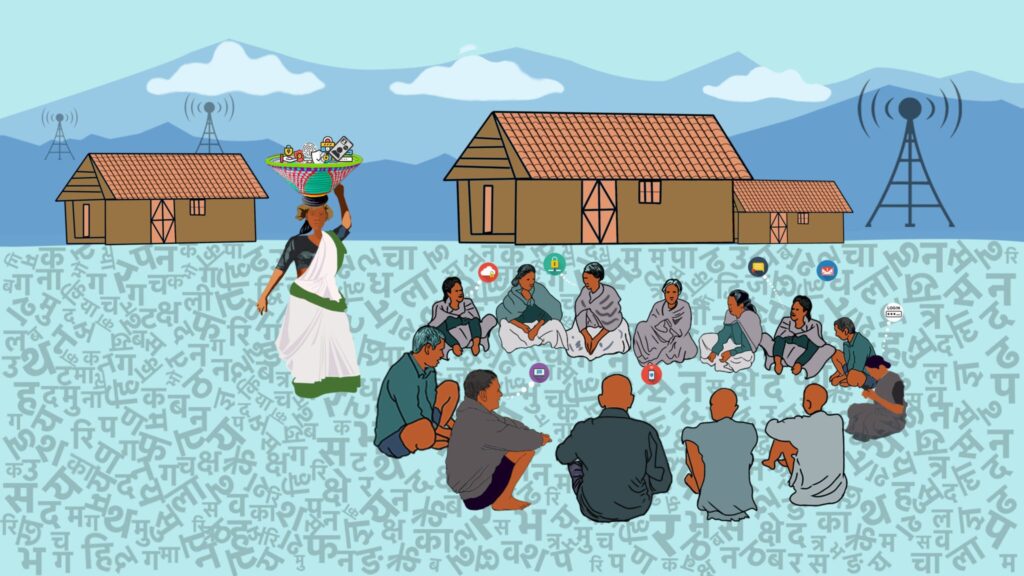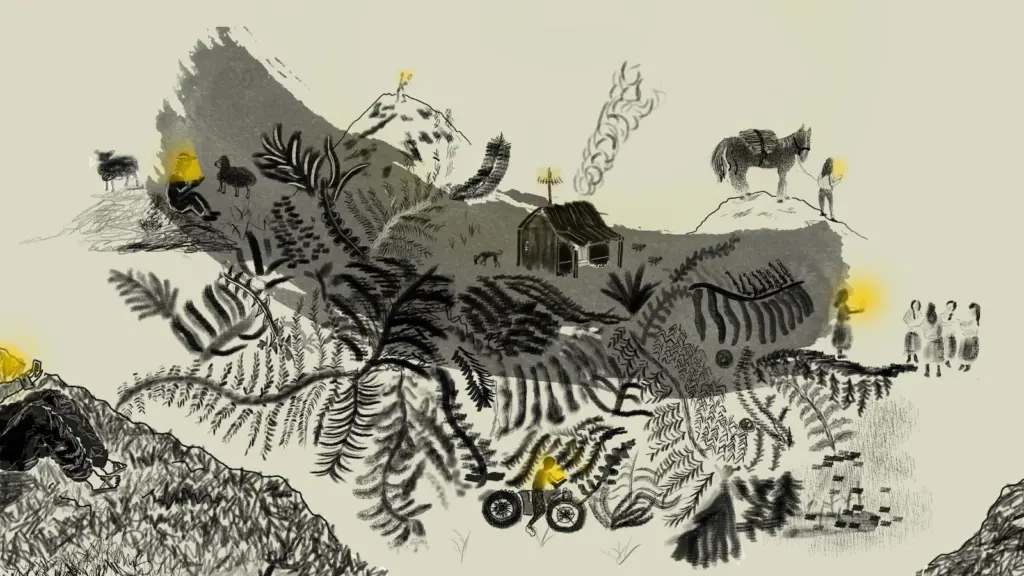What are the challenges and needs for activists and their communities speaking Indigenous, marginalized, minoritized, or low-resource languages in regard to digital safety and security?
In 2022, Rising Voices, together with 18 language justice activists, set out to explore this question. The researchers hailed from 18 unique Indigenous language communities across Africa, Asia, and Latin America. Much of what made this research unique – and powerful – was the participatory nature of the methodology. It facilitated a space for community-led research, the findings of which set the table for larger community impact by identifying priorities and recommendations from those directly affected by the themes explored.
Global Voices is an international network of writers, translators, and human rights defenders working to build understanding across the world of the internet. Its digital inclusion arm, Rising Voices, helps to bring new voices from communities speaking endangered or indigenous languages to the global conversation by facilitating the creation of peer learning networks to leverage the internet and digital media for their self-determined needs. Having worked with over 100 language justice activists in the past few years, Rising Voices recognized how digital security in relation to Indigenous languages online had been missing as a conversation in mainstream digital rights spaces. As such, they curated a study that gave space for language communities to explore their needs and challenges in relation to digital security.

Working with researchers coming from the very language communities who were a part of the study was essential to the success of the project. These language communities included Dagbani, Gĩkũyũ, Igbo, IsiZulu, Sesotho, Twi, Yorùbá, Angika, Eastern Tharu, Odia, Torwali, Kichwa, Kaqchikel, Mapudungun, Mixe, Yucatec Maya, Wayuunaiki, and Zapotec communities. Rising Voices drew from their existing networks and worked with researchers with whom they already had trusted relationships.Working with researchers coming from the very language communities who were a part of the study was essential to the success of the project. These language communities included Dagbani, Gĩkũyũ, Igbo, IsiZulu, Sesotho, Twi, Yorùbá, Angika, Eastern Tharu, Odia, Torwali, Kichwa, Kaqchikel, Mapudungun, Mixe, Yucatec Maya, Wayuunaiki, and Zapotec communities. Rising Voices drew from their existing networks and worked with researchers with whom they already had trusted relationships.
Two fundamental pieces made the research powerful. One was the freedom given to each researcher to carry out research and develop outputs in alignment with their analysis of the communities’ needs. Another was the prerequisite for researchers to give back to their respective communities what they had found. What made the research unique was the impact it has not only on digital security for local communities as a field of research, but also on the researchers and their communities themselves. The project has resulted in eighteen case studies of everyday lived experiences that can contribute to responsive intervention developments, as well as opportunities for learning and community strengthening through the research outputs. All researchers were pleased with the project and desired to continue the work, adding final reflections and suggestions towards the improvement of collaborations like this one. As one staff member of Rising Voices noted, “This makes us hopeful… [the research] can remain living.”
For this project, Rising Voices wanted to honour the freedom of each researcher in their exploration. The researchers, who were members of the language communities themselves, formulated their own approach and research questions. The questions they asked emerged from embodied experience and led to unique reflections. While the research remained oriented around a broad framework of exploring digital security in relation to Indigenous language communities, each researcher led the decision-making, from identifying the research question, to choosing research participants, methods for data collection and carrying it out, to analyzing findings and deciding how to communicate those findings back to those who participated in the study in terms of outputs. Importantly, they also decided what would not be published or shared with the public, among what they had learned in the research process, since their agency at every stage of the research, including how it was shared, was integral to the participatory nature of the process.

This freedom led to a diversity of approaches. Some chose to take a step back from digital security and explore internet access as a starting point. Some delved into the socioeconomic implications of digital security, while others outlined creative strategies for enabling it. Teachers, farmers, LGBTQ activists, Wikimedians, Elders and women political leaders were among the diversity of research participants that shaped the research findings. Community practices for preserving and defending Indigenous languages were centered in inquiries, from the conservation of basgharas in Nepal – communal knowledge-sharing spaces held in Eastern Tharu – by taking them online during the Covid-19 pandemic, to the use of the hashtag #GîkûyûTwitter in the face of backlash, to teach about the language or culture of the Agîkûyû in Kenya, engage with others and entertain people.This freedom led to a diversity of approaches. Some chose to take a step back from digital security and explore internet access as a starting point. Some delved into the socioeconomic implications of digital security, while others outlined creative strategies for enabling it. Teachers, farmers, LGBTQ activists, Wikimedians, Elders and women political leaders were among the diversity of research participants that shaped the research findings. Community practices for preserving and defending Indigenous languages were centered in inquiries, from the conservation of basgharas in Nepal – communal knowledge-sharing spaces held in Eastern Tharu – by taking them online during the Covid-19 pandemic, to the use of the hashtag #GîkûyûTwitter in the face of backlash, to teach about the language or culture of the Agîkûyû in Kenya, engage with others and entertain people.
Since the researchers had the opportunity to communicate the findings back to their respective communities, this also enabled sustainable processes of impact. With support from Rising Voices, each researcher developed a written report. However, at the end of the day, it was for the researchers to decide what to do with it. For many, the report presented raw material towards more powerful community interventions. Given that many Indigenous language speakers cannot read or write the language but perceive it orally, proposed methodologies for sharing the findings included producing radio content, and facilitating workshops with elders and youth. Most researchers thought beyond the written form.
A wide range of findings at the intersection of digital security and language justice came out of this research project. These include reflections in relation to hardware, keywords for writing the language, access to information, limitations to content creation, strategies for collective care, among others – all aspects of technology use that are not usually positioned as digital security concerns. The research questions and findings revealed the vast extent to which those working in digital security fields can learn from participatory research interventions at the local level, undertaken by researchers who are immersed daily in the digital security challenges their communities face, as well as the strategies for addressing them.
Researchers were also requested to write a blog that would share the story of their project. These blogs were published in English, translated back into the respective local languages, and even translated into other languages, such as Spanish, by Global Voices translators who thought that these stories should be made available in other languages for cross-regional learning. Even while intended for a wide audience, researchers were still given agency around how they wanted to tell the story. Rising Voices staff guiding the process were available to advise the researchers on the stories they could tell that would work best from a journalistic and advocacy perspective for a wide and international audience. In some cases, a researcher would agree, but still express preference towards a different way of telling the story. “It’s a good outcome of the process,” said one staff member of Rising Voices. The blogs are filled with knowledge and ideas that the researchers wanted to share, and the rest they were free to keep for themselves. The images attached to the blogs were also illustrated by artists from the very language communities studied, which contributed to tackling the questions of representation and visibility in the digital world.

Through this participatory research project, the communities of research benefited from the knowledge-sharing opportunities it presented. At the same time, the wider field of digital security gained invaluable knowledge of hyper-localized engagements with technology and digital security needs of Indigenous language speaking communities. The 18 research projects collectively surfaced themes related to countering digital safety threats and risks to language survival in Africa and Asia; community leaders including women, social justice activists, and Elders in Latin America and Africa as custodians of language; the politics of language marginalization in a digital age; and more.
Ultimately, this study provokes us to question the efficacy and value of conventional methods of research that do not enhance the agency of the communities being studied, and demonstrates the power of participatory research as a strategy for sustainable and responsive impact.
More about Rising Voices’ Digital Security + Language research study:
This post is the first of a four-part series on Rising Voices’ Digital Security + Language research study that explored the intersection of digital security and linguistic rights in collaboration with 18 researchers, from 18 different language communities in Africa, Asia and Latin America.
Read the rest of the blog series:

